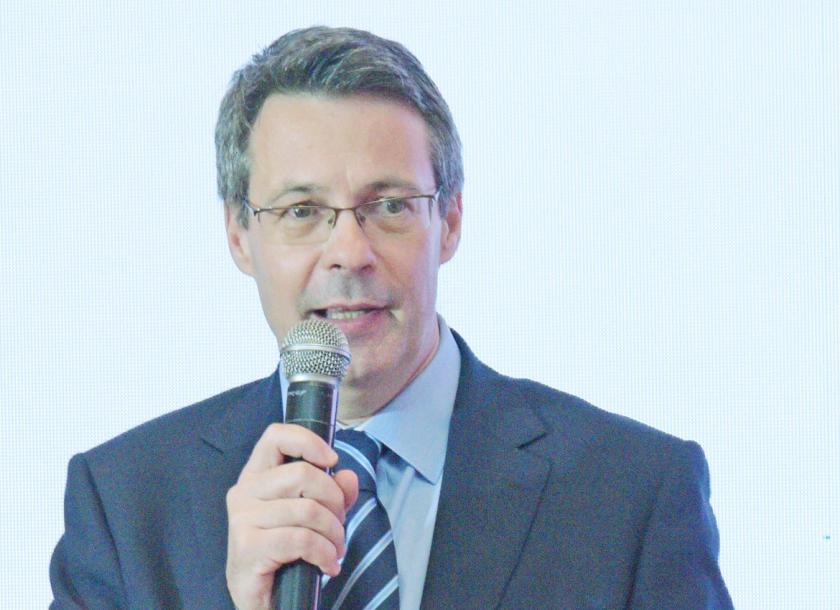Myanmar: ATM makers eye Myanmar market
With less than 2,000 ATMs installed in the country, Myanmar has the lowest ATMs per million population ratio of 33 among all ASEAN countries. In contrast, Thailand had the highest ratio of well above 900.
The two companies are also going neck-to-neck in Myanmar at a time when the local banks are targeting expansion and financial inclusion. As such, many also want ATMs that will not only help them raise the number of bank account holders, but also reduce costs.
With more intelligent ATMs installed at convenient locations across the country, banks will save costs by eliminating the need to set up physical branches or kiosks. Take NCR’s cash-recycling ATMs, which allows bank account holders to withdraw as well as deposit thick wads of cash, for example.
“Cash is recycled when some customers make deposits and others withdraw from that same pile of cash. Our ATMs are savvy enough to update each customer’s bank accounts accordingly as well as detect notes that are counterfeit,” said Tom Cheong, Head, Channels (Asia Pacific) at NCR.
That eliminates the need for banks to set up branches across the country, allowing them to save on setup and staff costs. It also raises productivity and efficiency, as the ATMs no longer need to be constantly supplied with fresh money.
Diebold Nixdorf is also expanding. This year, it signed a contract with CB Bank to expand the bank’s self-service offerings beyond Yangon. The contract involved 500 new cash-recycling ATMs, taking CB Bank’s existing network of ATMs to 1,000.
More recently, Diebold Nixdorf also installed two new currency exchange machines for CB Bank, one of which is at the Sule Shangri-La Hotel. The machine enables users to exchange their US, Singapore, Thai and Malaysian currencies into the local kyat without having to visit a money changer or kiosk.
“At the moment, the currency exchange machines will be near a physically-manned kiosk just in case there are disputes such as the machine rejecting notes. But, moving forward, CB Bank wants to be the first bank to have these ATMs replace money changers at all the hotels and airports,” said Piers Leach, country manager at Diebold Nixdorf.
New trends
Meanwhile, user requirements at the ATM are evolving “The process at the ATM is becoming easier and simpler. We are targeting business travelers and tourists, who can now get cash and foreign currencies at our ATMs without needing to go to the bank or a physical money changer,” said Mr Leach.
NCR is also upping its game. “We are installing new, cash-recycling ATMs that can dispense large wads of cash and which come with remote video-enabled assistance so customers can get help when they need to,” Mr Cheong said.
In total, NCR claims it will have installed 1,200 ATMs across the country by the end of the year since it first entered Myanmar in 2012. Diebold Nixdorf meanwhile, says it has installed 2,000 ATMs in the country since 2011. The two ATM makers count the likes of Kanbawza Bank, Ayeyarwady Bank, Yoma Bank, CB Bank as well as some of the State-owned banks as their main clients.

Tom Cheong: “We are moving on from providing the hardware and software for ATMs, to providing services that banks can subscribe.” Photo – Supplied
While vast swathes of the population have yet to register for a bank account, things are evolving fast.
“We are already talking to CB Bank about ATMs that will enable users to get cash via QR codes on their phones or biometric thumb prints without needing an ATM card. They will also be able to open a bank account and pay bills at the ATM in the near future,” said Mr Leach.
NCR, too, is in the process of bringing a suite of cloud-based ATM services and solutions to its bank clients. “We are moving on from providing the hardware and software for ATMs, to providing services that banks can subscribe to for their ATMs such as enabling the use of phones to access their bank accounts instead of cards,” said Mr Cheong.
Cash still king
Notably, the banks are competing aggressively for bank accounts and ATMs just as competition in the mobile financial services space is heating up. Now, financial technology firms like Wave Money, True Money and OK Dollar, which provide mobile payment services, are offering users the option of bypassing the ATM completely.
Mr Cheong isn’t too worried though. “In Myanmar, people will still need to handle cash for a very long time. By making ATMs more intelligent and user-friendly, people here will still use it to deposit and withdraw cash. Our focus is to make that process easier. For example, allowing them to keep and dispense cash using their phones and providing video assistance when problems arise.”
Mr Leach agrees. The way he sees it, “cash is still king. It is still the main means of doing business here. In any case, 95pc of the population don’t have bank accounts, which gives the banks a large market in which to expand. In fact, the banks want at least a third of the population to be banked by 2020. That is a good opportunity for ATMs to leave their mark.”
Source: https://www.mmtimes.com/news/atm-makers-eye-myanmar-market.html


 English
English




